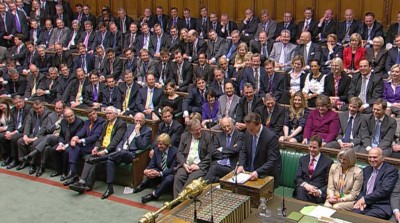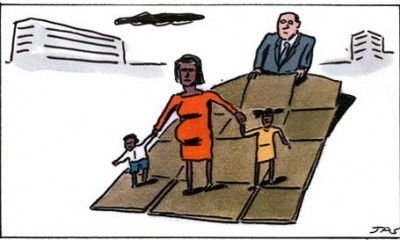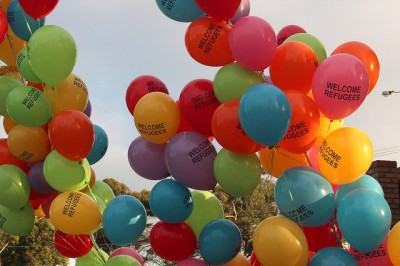Engender blog
All of Engender’s latest news. Reports, reviews, books, articles, and information from across Scotland’s women’s sector.
We would love to hear from other feminists around Scotland. Check out our guidelines for more information on how you can blog for us.
Guest blog: Indyref, women and politics (Indyref Thursday #5)
 In the run-up to our event on 'gender equality, the referendum and beyond', we'll be publishing a weekly blog to correspond with our 'Scotland's futures' briefing papers series. This week, guest blogger Ann Henderson considers gender implications in terms of politics and power.
In the run-up to our event on 'gender equality, the referendum and beyond', we'll be publishing a weekly blog to correspond with our 'Scotland's futures' briefing papers series. This week, guest blogger Ann Henderson considers gender implications in terms of politics and power.
When reviewing the statistics for political representation for women in the UK and in Scotland, we have rightly been proud of the progress made when the Scottish Parliament was established. In 1999 our Parliament sat 4th in the world rankings on parliamentary representation, with 37.2% of our new Parliamentarians being female.
Guest blog: Indyref and violence against women (Indyref Thursday #4)

By Marsha Scott
In the run-up to our event on 'gender equality, the referendum and beyond', we'll be publishing a weekly blog to correspond with our 'Scotland's futures' briefing papers series.This week, guest blogger Marsha Scott considers implications in terms of violence against women.
Violence against women (VAW) is one of the feminist “Big 3”, alongside women’s poverty and women’s power deficit in public life. The policy context for VAW is perhaps the most devolved, the most significant exception being the no-recourse-to-public-funds rule, which prohibits provision of public assistance for women with uncertain immigration status. It is hard to imagine a post-referendum government in London in the near future that will either change this rule or allow Scotland to make its own rules about eligibility for public benefit. Scottish administrations have demonstrated some political interest in redressing the no-recourse problem in the face of constraints under the Scotland Act, and one could argue that attitudes toward immigrants and immigration policy are likely to support an improved prospect should Scotland vote yes in the referendum.
Guest blog: Childcare provision and the independence referendum (Indyref Thursday #3)
By Craig McAngus
This guest blog by Craig McAngus was originally posted on the Scottish Centre on Constitutional Change website. He is currently researching the implications of constitutional change for gender equality.
The 18th of September is fast approaching and the two main campaigns are stepping up their efforts to try and shore up their own vote whilst appealing to the undecided. One particular group that has been catching the attention of both the psephologists and the campaigns alike is women. Still more likely to be undecided, the women of Scotland have become a key group of voters that may yet hold the key to the result we wake up to (or stay up for) on the 19th of September. The Scottish Government has been accused by its opponents of trying to lure women into voting Yes with policy ‘bribes’ such as extended childcare and alleged ‘token gestures’ like bringing more women, namely Shona Robison and Angela Constance, into the cabinet. However, advocates of Yes argue that Scotland can become a more gender equal place after independence through measures such as ‘transformational’ childcare. However, little is known about what voters think about these issues.
Guest blog: Indyref, women and poverty (Indyref Thursday #2)

By Angela O'Hagan
In the run-up to our event on 'gender equality, the referendum and beyond', we'll be publishing a weekly blog to correspond with our 'Scotland's futures' briefing papers series. This week, guest blogger Angela O'Hagan considers implications in terms of women's poverty.
Will women be poorer in a post-Referendum Scotland? Will independence or devo-max put a stop to the onward march of women’s - and men’s - poverty in Scotland?
As ever, the answers are in part up to us and the decisions we make on 18 September and the pressure we put on politicians now and after the vote, to act for change and for the alternatives that are possible.
Refugee Women's Strategy Group, Umoja Inc, and Engender launch reports on gender and asylum

In June 2014 Engender, Umoja Inc and the Refugee Women’s Strategy Group (RWSG) held an event as part of Refugee Week in Glasgow. The aim of this event was to come together to celebrate refugee women in Scotland and launch two pieces of work that seek to capture the experience of asylum seeking women: the RWSG’s Speak for Yourself report and Engender’s briefing paper on gender and the asylum system.
Speak for Yourself is the product of 100 interviews with asylum seeking women. It identifies some of the critical issues that asylum seeking women face, including access to work, education, housing, and health. Women also spoke about the challenge of the asylum process itself.
Downloads
 Engender Briefing: Pension Credit Entitlement Changes
From 15 May 2019, new changes will be introduced which will require couples where one partner has reached state pension age and one has not (‘mixed age couples’) to claim universal credit (UC) instead of Pension Credit.
Engender Briefing: Pension Credit Entitlement Changes
From 15 May 2019, new changes will be introduced which will require couples where one partner has reached state pension age and one has not (‘mixed age couples’) to claim universal credit (UC) instead of Pension Credit.
 Engender Parliamentary Briefing: Condemnation of Misogyny, Racism, Harassment and Sexism
Engender welcomes this Scottish Parliament Debate on Condemnation of Misogyny, Racism, Harassment and Sexism and the opportunity to raise awareness of the ways in which women in Scotland’s inequality contributes to gender-based violence.
Engender Parliamentary Briefing: Condemnation of Misogyny, Racism, Harassment and Sexism
Engender welcomes this Scottish Parliament Debate on Condemnation of Misogyny, Racism, Harassment and Sexism and the opportunity to raise awareness of the ways in which women in Scotland’s inequality contributes to gender-based violence.
 Gender Matters in Social Security: Individual Payments of Universal Credit
A paper calling on the Scottish Government to automatically split payments of Universal Credit between couples, once this power is devolved to the Scottish Parliament.
Gender Matters in Social Security: Individual Payments of Universal Credit
A paper calling on the Scottish Government to automatically split payments of Universal Credit between couples, once this power is devolved to the Scottish Parliament.
 Gender Matters Manifesto: Twenty for 2016
This manifesto sets out measures that, with political will, can be taken over the next parliamentary term in pursuit of these goals.
Gender Matters Manifesto: Twenty for 2016
This manifesto sets out measures that, with political will, can be taken over the next parliamentary term in pursuit of these goals.
 Scottish NGO Briefing for UN Special Rapporteur on Violence Against Women
Joint briefing paper for the UN Rapporteur on Violence Against Women.
Scottish NGO Briefing for UN Special Rapporteur on Violence Against Women
Joint briefing paper for the UN Rapporteur on Violence Against Women.

Newsletter
Sign up to receive our newsletter here:
Sign up to our mailing list
Receive key feminist updates direct to your inbox: